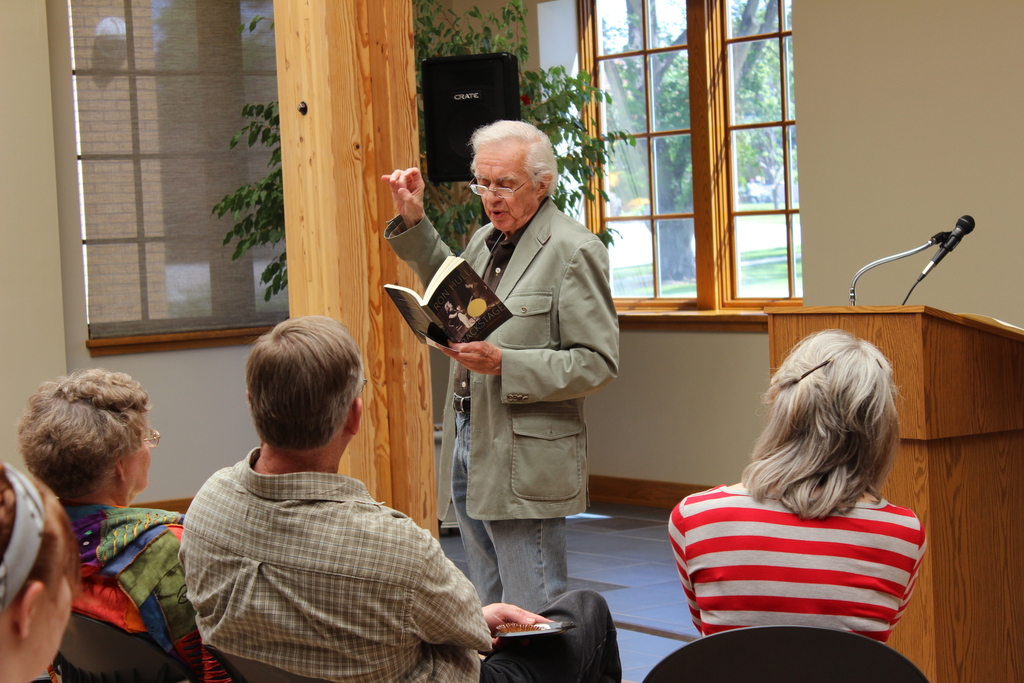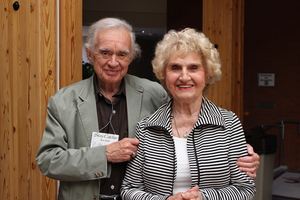Early days of Nebraska Public Television described in 'Backstage'

Nebraska Public Television pioneer Ron Hull encouraged participants in the Story Catcher Summer Writing Workshop and Festival to, “Tell it the way it is,” during the final presentation of the four-day event hosted at Chadron State College.
A personal friend of Mari Sandoz and founding member of the Mari Sandoz Heritage Society, Hull described friendships and experiences included in his recently published book “Backstage: Stories from My Life in Public Television” Friday afternoon in the Mari Sandoz High Plains Heritage Center.
“Do you have a story you have to tell? Do people tell you that you should write your stories? Do people ask you if you have written a book?” Hull said.
Hull said when Sandoz wrote “Old Jules,” the publisher warned that she could be sued by those portrayed in a negative manner. She responded that she always kept back a few details, and if anyone tried to sue her she would release everything she knew.
The strategy worked for Sandoz, she was never sued.
He urged the audience members to seize opportunities to learn from master writers, relating times he spent working at Sandoz’s home New York.
Hull said his motivation in publishing his book was to extend the lives of those, like Sandoz, who made a difference in his life. So, with encouragement from Virginia Faulkner, an outstanding editor who worked with Sandoz, Hull wrote the book.
“Virginia was one of the most interesting people I’ve ever known. Mari contended with her throughout the editing process. I thought at times they might harm each other. But, in the end, Mari said Virginia was a great editor. I hope she told her that, but I don’t know if she did,” Hull said.
Another prominent friend of Hull’s featured in the book is Nebraska poet laureate Jon Neihardt. He helped advance public television in Nebraska.
“Once, he recited, from memory, over 20 minutes worth from his book, ‘Black Elk Speaks,’ verbatim. Neihardt joked that he felt 18 instead of 81,” Hull said.
Hull shared several other examples of his first-hand interactions with the visionaries and detractors who played a part in the development of public television.
In the fledgling days of Nebraska Public Television, Hull and his crew used cameras and microphone during off hours at the Channel 10 studio in Lincoln.
At one point Hull was tasked with teaching swimming on public television even though he did not have access to a pool or underwater cameras.
“How was I going to do this? I used a technique called limbo lighting. The backdrop and floor were painted black. I got an ironing board and painted it black. Then a young girl on the ironing board demonstrated the swimming strokes with the assistance of an instructor. Over to the side, I had a college student making splashing sounds in a fish tank and, later, I superimposed the water images over the video of the girl.”
Hull said “Backstage,” his first book, took six years of rewriting and throwing things out. He originally began to capture the stories for his family and then, during the process, realized that the public might be interested in it, as well.
“I’ve worked in TV but it is ephemeral. Books are lasting. Publishing is a worthy pursuit. When the publisher sends you 10 free copies, it becomes real,” he said.
Category: Campus News

